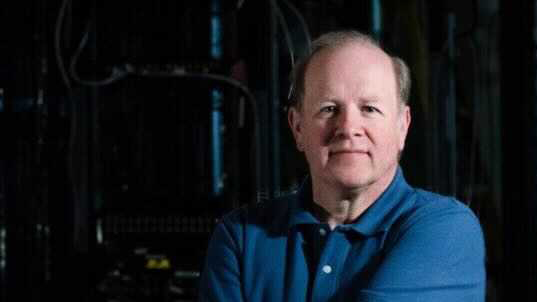In 2019, Peter Chapman was working at Amazon when he got a call from an executive recruiter looking to hire a president and CEO for a quantum computing company.
“I said to the person at the time, ‘You must be able to find somebody that has more quantum experience than I do because I have none,’” Chapman said.
But the company, IonQ, was not looking for someone with knowledge of quantum computing — they wanted someone with software and business experience, and Chapman fit the bill. He took the job.
Now, about two years later, Chapman is preparing for another job: University of Maryland commencement speaker.
In mid-April, the university announced Chapman would speak at the spring commencement on May 21 — two in-person events that would also be open to 2020 graduates.
He will be giving his speech over video and hopes to add visual elements, drawing on his experience in the video game industry.
“I’m really looking forward to it,” he said. “Hopefully, it won’t be the usual boring person droning on for 10 minutes, but it’ll be a little more interesting than that.”
[After merger, College Park startup IonQ plans to go public with $2 billion valuation]
Two professors — University of Maryland professor Christopher Monroe and Duke University professor Jungsang Kim — founded IonQ in 2015. The company works on creating hardware for quantum computing.
Earlier this year, IonQ, which is based in College Park’s Discovery District, announced it would become the first publicly traded company to specialize in commercialized quantum computing.
According to Forbes, quantum computing attempts go “beyond the capabilities of a classical computer,” solving more problems at the same time and at faster rates.
Discovery District manager Sammy Popat says Chapman’s industry knowledge helped the company move to a new level. Chapman was able to take the basic concepts behind IonQ and create a marketable product and company.
“Having someone like Peter Chapman is an on-ramp into the marketplace,” Popat said.
Steven Rolston, professor and chair of this university’s physics department, said IonQ allows opportunities for graduate students and postdoctorates to work and train.
The company continues to work on research with this university and hires many of its graduating students, Chapman said.
“That’s a huge benefit to the company, to have kind of direct access to a workforce,” Chapman said.
[College Park City Council hears plans for new development in Discovery District]
The university recently launched the Quantum Startup Foundry led by Julie Lenzer, the university’s chief innovation officer. Part of the foundry’s work is connecting researchers with people with business experience, Lenzer said, and IonQ is a successful example of how these two types of people can work together to prosper.
Lenzer hopes Chapman’s story inspires graduates to reflect on how they can make an impact.
“I’m really hopeful that they see the opportunity to think big, and to really think about … how they really can change the world,” Lenzer said. “It doesn’t happen overnight. You have to be patient. But persistence is key.”
Chapman has been taking part in this reflective process while writing his speech. In his lifetime, he said he has seen the evolution of computers.
When Chapman first joined IonQ, he saw an article about how quantum computing would fail. Now, he said, quantum computing will likely soon be in almost every aspect of people’s lives.
And when it comes to the university’s graduating class and the younger generation, Chapman has high hopes.
“People in this class will go on and not only build quantum computers but solve cancer and solve Alzheimer’s and maybe aging itself,” he said.



